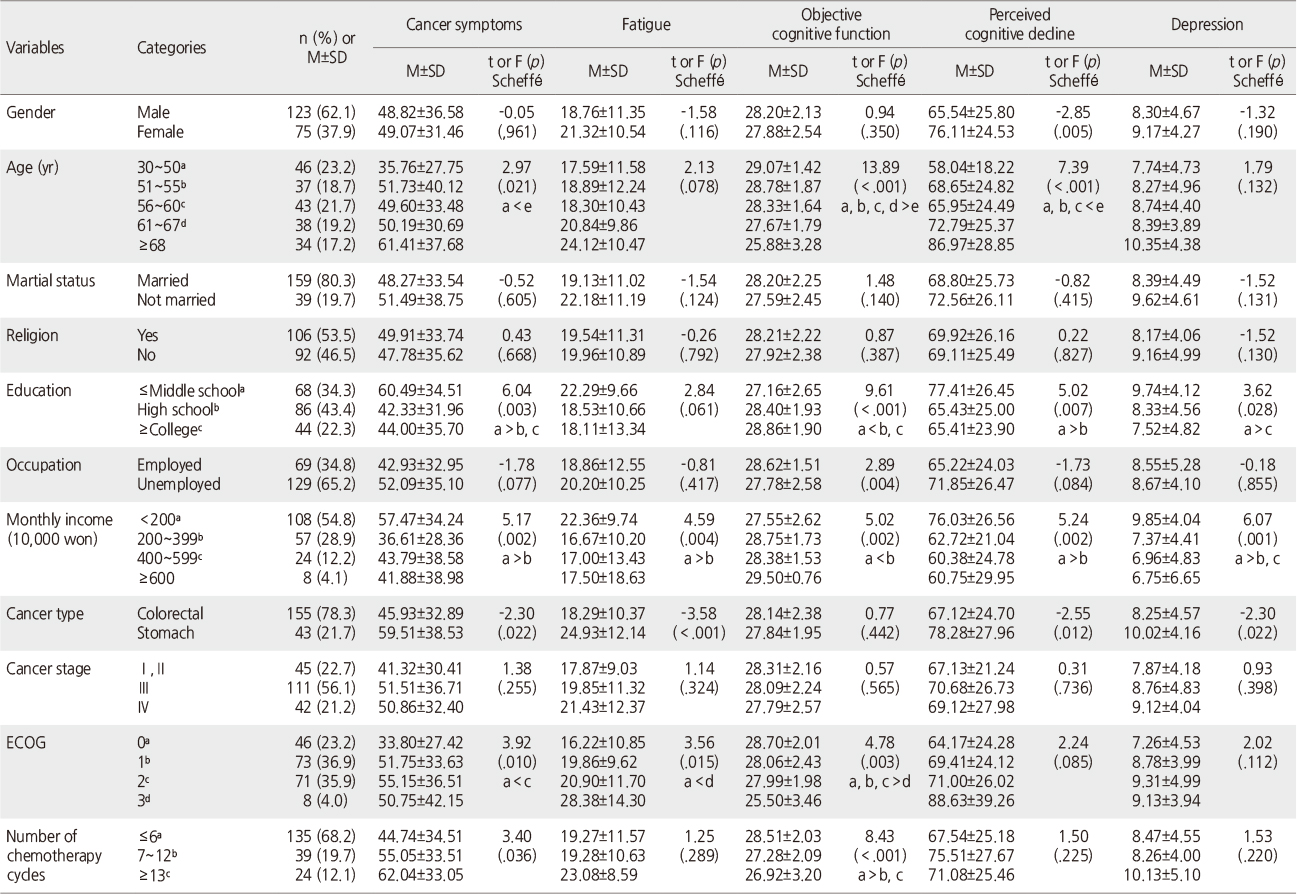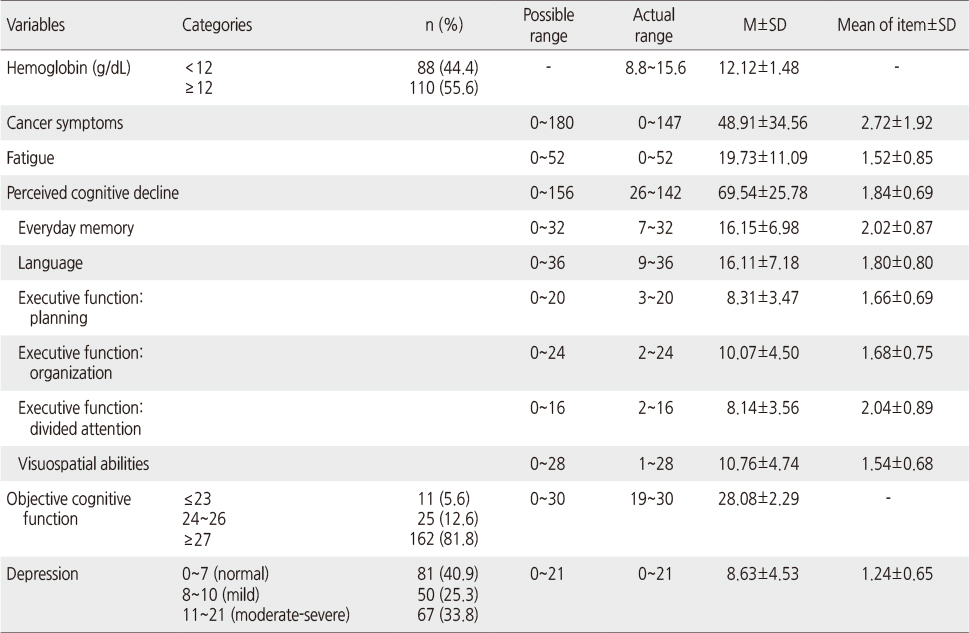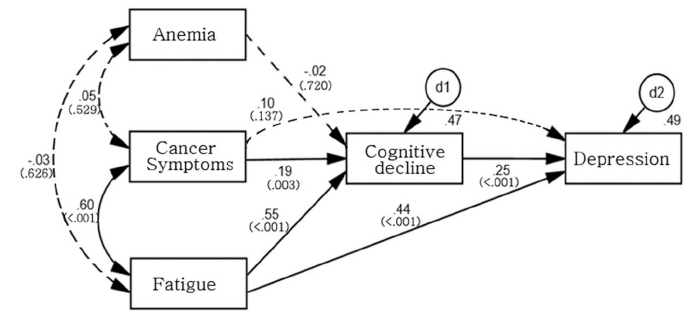Articles
- Page Path
- HOME > J Korean Acad Nurs > Volume 46(3); 2016 > Article
-
Original Article
- Effect of Cancer Symptoms and Fatigue on Chemotherapy-related Cognitive Impairment and Depression in People with Gastrointestinal Cancer
- Pok Ja Oh, Jung Ran Lee
-
Journal of Korean Academy of Nursing 2016;46(3):420-430.
DOI: https://doi.org/10.4040/jkan.2016.46.3.420
Published online: June 30, 2016
Department of Nursing, Sahmyook University, Seoul, Korea.
- Address reprint requests to: Lee, Jung Ran. Department of Nursing, Sahmyook University, 815 Kongnung-dong, Hwarang-ro, Nowon-gu, Seoul 01795, Korea. Tel: +82-2-3399-1589, Fax: +82-2-3399-1594, jrwin@naver.com
© 2016 Korean Society of Nursing Science
This is an Open Access article distributed under the terms of the Creative Commons Attribution NoDerivs License. (http://creativecommons.org/licenses/by-nd/4.0/) If the original work is properly cited and retained without any modification or reproduction, it can be used and re-distributed in any format and medium.
Abstract
-
Purpose
- The purpose of this study was to test a hypothetical model of chemotherapy-related cognitive impairment (CRCI) and depression in people with gastrointestinal cancer.
-
Methods
- A purposive sample of 198 patients undergoing chemotherapy was recruited from November 2014 to July 2015. The instruments were Everyday Cognition (ECog), Hospital Anxiety Depression Scale (HADS), Functional Assessment of Chronic Illness Therapy-Fatigue (FACIT-F), and M. D. Anderson Symptom Inventory-Gastrointestinal Cancer Module. Data were analyzed using descriptive statistics, correlation, and path analysis.
-
Results
- CRCI was directly affected by cancer symptoms (β=.19, p=.004) and fatigue (β=.56, p<.001)(R2=47.2%). Depression was directly affected by fatigue (β=.48, p<.001) and CRCI (β=.27, p<.001). However, The impact of cancer symptoms on depression was confirmed through the mediating effect of CRCI.
-
Conclusion
- Results indicate that in patients with gastrointestinal cancer undergoing chemotherapy along with the direct physiologic effects (fatigue, symptoms) of cancer treatment may have altered cognitive function leading to depression.
This research was supported by Basic Science Research Program through the National Research Foundation of Korea (NRF) funded by the Ministry of Education (2014R1A1A2053517)
The authors declared no conflict of interest.
- 1. Ministry of Health & Welfare, Korea Central Cancer Registry, National Cancer Center. Annual report of cancer statistics in Korea in 2012. Seoul: Ministry of Health & Welfare; 2014.Report No:11-1352000-000145-10.
- 2. Gehring K, Roukema JA, Sitskoorn MM. Review of recent studies on interventions for cognitive deficits in patients with cancer. Expert Rev Anticancer Therapy. 2012;12(2):255–269. Article
- 3. Kaiser J, Bledowski C, Dietrich J. Neural correlates of chemotherapy-related cognitive impairment. Cortex. 2014;54:33–50. ArticlePubMed
- 4. Ahles TA, Saykin AJ, Furstenberg CT, Cole B, Mott LA, Skalla K, et al. Neuropsychologic impact of standard-dose systemic chemotherapy in long-term survivors of breast cancer and lymphoma. J Clin Oncol. 2002;20(2):485–493.ArticlePubMed
- 5. Hutchinson AD, Hosking JR, Kichenadasse G, Mattiske JK, Wilson C. Objective and subjective cognitive impairment following chemotherapy for cancer: A systematic review. Cancer Treat Rev. 2012;38(7):926–934. ArticlePubMed
- 6. Kanaskie ML. Chemotherapy-related cognitive change: A principlebased concept analysis. Oncol Nurs Forum. 2012;39(3):E241–E248. ArticlePubMed
- 7. Krynetskiy E, Krynetskaia N, Rihawi D, Wieczerzak K, Ciummo V, Walker E. Establishing a model for assessing DNA damage in murine brain cells as a molecular marker of chemotherapy-associated cognitive impairment. Life Sci. 2013;93(17):605–610. ArticlePubMedPMC
- 8. Hyrien O, Dietrich J, Noble M. Mathematical and experimental approaches to identify and predict the effects of chemotherapy on neuroglial precursors. Cancer Res. 2010;70(24):10051–10059. ArticlePubMedPMCPDF
- 9. de Ruiter MB, Reneman L, Boogerd W, Veltman DJ, Caan M, Douaud G, et al. Late effects of high-dose adjuvant chemotherapy on white and gray matter in breast cancer survivors: Converging results from multimodal magnetic resonance imaging. Hum Brain Mapp. 2012;33(12):2971–2983. ArticlePubMed
- 10. Lange M, Rigal O, Clarisse B, Giffard B, Sevin E, Barillet M, et al. Cognitive dysfunctions in elderly cancer patients: A new challenge for oncologists. Cancer Treat Rev. 2014;40(6):810–817. ArticlePubMed
- 11. Chung BY, Cho EJ. Correlates influencing cognitive impairment in breast cancer patients receiving chemotherapy. Asian Oncol Nurs. 2012;12(3):221–229. ArticlePDF
- 12. Park JH, Bae SH, Jung YS, Jung YM. Prevalence and characteristics of chemotherapy-related cognitive impairment in patients with breast cancer. J Korean Acad Nurs. 2015;45(1):118–128. ArticlePubMedPDF
- 13. Hess LM, Insel KC. Chemotherapy-related change in cognitive function: A conceptual model. Oncol Nurs Forum. 2007;34(5):981–994. ArticlePubMed
- 14. Vardy J, Tannock I. Cognitive function after chemotherapy in adults with solid tumours. Crit Rev Oncol Hematol. 2007;63(3):183–202. ArticlePubMed
- 15. Cella D, Davis K, Breitbart W, Curt G. Cancer-related fatigue: Prevalence of proposed diagnostic criteria in a United States sample of cancer survivors. J Clin Oncol. 2001;19(14):3385–3391.ArticlePubMed
- 16. Deimling GT, Kahana B, Bowman KF, Schaefer ML. Cancer survivorship and psychological distress in later life. Psychooncology. 2002;11(6):479–494. ArticlePubMed
- 17. Mun SB. Basic concepts and applications of structural equation modeling. Seoul: Hakjisa Corp.; 2009.
- 18. Wang XS, Williams LA, Eng C, Mendoza TR, Shah NA, Kirkendoll KJ, et al. Validation and application of a module of the M. D. Anderson symptom inventory for measuring multiple symptoms in patients with gastrointestinal cancer (the MDASI-GI). Cancer. 2010;116(8):2053–2063. ArticlePubMed
- 19. Cella D, Yount S, Sorensen M, Chartash E, Sengupta N, Grober J. Validation of the functional assessment of chronic illness therapy fatigue scale relative to other instrumentation in patients with rheumatoid arthritis. J Rheumatol. 2005;32(5):811–819.PubMed
- 20. Kim H, Yoo HJ, Kim YJ, Han OS, Lee KH, Lee JH, et al. Development and validation of Korean functional assessment cancer therapy-general (FACT-G). Korean J Clin Psychol. 2003;22(1):215–229.
- 21. Folstein MF, Folstein SE, McHugh PR. "Mini-mental state". A practical method for grading the cognitive state of patients for the clinician. J Psychiatr Res. 1975;12(3):189–198.PubMed
- 22. Kang Y. A normative study of the Korean-mini mental state examination (K-MMSE) in the elderly. Korean J Psychol. 2006;25(2):1–12.
- 23. Prabhu RS, Won M, Shaw EG, Hu C, Brachman DG, Buckner JC, et al. Effect of the addition of chemotherapy to radiotherapy on cognitive function in patients with low-grade glioma: Secondary analysis of RTOG 98-02. J Clin Oncol. 2014;32(6):535–541. ArticlePubMedPMC
- 24. Farias ST, Mungas D, Reed BR, Cahn-Weiner D, Jagust W, Baynes K, et al. The measurement of everyday cognition (ECog): Scale development and psychometric properties. Neuropsychology. 2008;22(4):531–544. ArticlePubMedPMC
- 25. Zigmond AS, Snaith RP. The hospital anxiety and depression scale. Acta Psychiatr Scand. 1983;67(6):361–370.ArticlePubMed
- 26. Oh SM, Min KJ, Park DB. A study on the standardization of the hospital anxiety and depression scale for Koreans: A comparison of normal, depressed and anxious groups. J Korean Neuropsychiatr Assoc. 1999;38(2):289–296.
- 27. Heo J. AMOS structural equation modeling. Seoul: Hannare Publishing Co.; 2013.
- 28. Park JG, Park CI, Kim NK. Oncology. Seoul: Ilchokak; 2003.
- 29. Kim GD. Impact of climacteric symptoms and fatigue on the quality of life in breast cancer survivors: The mediating effect of cognitive dysfunction. Asian Oncol Nurs. 2014;14(2):58–65. ArticlePDF
- 30. Baek Y, Yi M. Factors influencing quality of life during chemotherapy for colorectal cancer patients in South Korea. J Korean Acad Nurs. 2015;45(4):604–612. ArticlePubMedPDF
REFERENCES
Cancer Symptoms, Fatigue, Cognitive Function, and Depression according to General Characteristics of Participants (N=198)

Descriptive Statistics of Cancer Symptoms, Fatigue, Objective Cognitive Function, Perceived Cognitive Decline, and Depression (N=198)

Figure & Data
REFERENCES
Citations

- Low Back Pain and Its Influencing Factors among Intensive Care Unit Nurses: A Cross-sectional Study
Hyun Ju Uhm, Hye-Ja Park
Journal of Health Informatics and Statistics.2022; 47(2): 95. CrossRef - Factors affecting the quality of life of gastric cancer survivors
Jahyun Choi, Sanghee Kim, Mona Choi, Woo Jin Hyung
Supportive Care in Cancer.2022; 30(4): 3215. CrossRef - Attitudes About Coping With Fatigue in Patients With Gastric Cancer
Eun Ja Yeun, Misoon Jeon
Gastroenterology Nursing.2020; 43(1): 97. CrossRef - Symptom Distress and Depression in Patients with Recurrent Gynecologic Cancer Undergoing Chemotherapy: Mediating Effect of Resilience
Eun Jung Yang, Ho Sihn Ryu
Korean Journal of Adult Nursing.2019; 31(1): 28. CrossRef - Computerized programs for cancer survivors with cognitive problems: a systematic review
Yoonjung Kim, Sook Jung Kang
Journal of Cancer Survivorship.2019; 13(6): 911. CrossRef - Changes of Cognitive Function and Depression following Chemotherapy in Women with Breast Cancer: A Prospective Study
Pok Ja Oh, Jung Ran Lee, Hyun Ah Kim
Asian Oncology Nursing.2018; 18(2): 66. CrossRef - Symptom Clusters and Quality of Life in Subjects With COPD
Kyeung Eun Lim, Sung Reul Kim, Hyun Kyung Kim, So Ri Kim
Respiratory Care.2017; 62(9): 1203. CrossRef


Figure 1-A
Figure 1-B
Cancer Symptoms, Fatigue, Cognitive Function, and Depression according to General Characteristics of Participants (N=198)
ECOG=Eastern cooperative oncology group.
Descriptive Statistics of Cancer Symptoms, Fatigue, Objective Cognitive Function, Perceived Cognitive Decline, and Depression (N=198)
Correlations among Cancer Symptoms, Anemia, Fatigue, Objective Cognitive Function, Perceived Cognitive Decline, and Depression (N=198)
Total Effect, Direct Effect, and Indirect Effect
SE=Standard error; CR=Critical ratio; SMC=Squared multiple correlations.
ECOG=Eastern cooperative oncology group.
SE=Standard error; CR=Critical ratio; SMC=Squared multiple correlations.
 KSNS
KSNS
 E-SUBMISSION
E-SUBMISSION




 Cite
Cite

